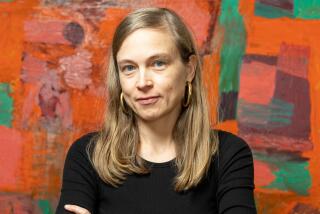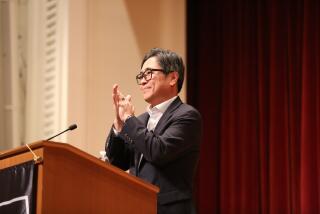Sweden poet Tomas Transtromer awarded Nobel Prize in literature
With the prize announcement moments away and the phone resolutely silent, Tomas Transtromer figured that his chance for Nobel glory had slipped by once again.
As Sweden’s most lauded poet and a perennial favorite for the literature prize, Transtromer was used to the feeling. But just a few minutes before the rest of the world heard it, the Stockholm native received the unexpected news Thursday that he had won after all. Word came in a slightly tardy (local) call from the Swedish Academy, which bestows the coveted award.
“We were very surprised,” Transtromer’s wife, Monica, told the regiment of reporters who swiftly converged on their home in the Swedish capital.
Now 80, Transtromer is in a wheelchair and can speak only a few words because of a stroke two decades ago. Although his literary output has since diminished, he had already built up a small but acclaimed body of verse famous in poetry circles for its intimate, evocative and sometimes mystical descriptions of nature and the human mind.
For such works as “Baltics” and “Windows and Stones,” literary critics have praised Transtromer’s gift for making fine, concentrated observations without ducking larger questions. Later in life, he began exploring complex themes of memory, aging and death.
The Nobel committee said that “through his condensed, translucent images, he gives us fresh access to reality.”
Transtromer is the first Swedish writer since 1974 to be awarded the prize, which carries a financial award of about $1.4 million. When his name was read out at the academy’s headquarters in Stockholm, journalists and others who had gathered whooped and applauded.
The academy’s permanent secretary, Peter Englund, said the committee was mindful of potential charges of bias but that Transtromer’s worthiness was not in doubt.
“We have been quite thoughtful about this, not being rash in choosing a Swede,” Englund said, noting that Transtromer’s works have been translated into about 60 languages. “He is well known among people who read poetry.”
In the United States, Transtromer’s work has been championed since the 1960s by writer Robert Bly. The most recent U.S. publication of his work, a side-by-side English and Swedish edition of his 1990 collection “The Sorrow Gondola,” was published last year by the small Los Angeles-based independent house Green Integer.
“Our print run was very small, 1,000 copies,” said publisher Douglas Messerli. The Nobel will change that significantly. “I’ve just ordered today 5,000 more.”
Transtromer’s complete works can be found in a single English volume published by New Directions Press, the 288-page “The Great Enigma,” which includes a short memoir he wrote after his 1990 stroke.
The son of a teacher and a journalist, Transtromer studied history, poetry, religion and psychology at Stockholm University. At 23, he came out with a highly regarded debut collection titled “17 Poems.”
For many years, he worked as a psychologist, often with juvenile delinquents and drug addicts. The Nobel committee said Transtromer has in fact never been a full-time writer, which explains why his complete oeuvre is on the slim side.
To his admirers, any lack of quantity is more than compensated for by quality. And though the Swedish landscape, especially the Stockholm archipelago, looms large in his work, Transtromer’s lyricism transcends geography, said Mats Soderlund, director of the Swedish Writers’ Union.
“It’s very universal. He comes very close to what it means being human and being present in the world, in the moment,” Soderlund said. “It’s a very subtle poetry, no big gestures.”
But like many Swedes, Soderlund did not expect his countryman finally to win the prize after having been passed over for so many years.
Even Transtromer’s publisher, Eva Bonnier, held out little hope, deciding to skip the live announcement of the prizewinner on Swedish television at 1 p.m.
“I didn’t want to be disappointed another time. I thought, this is never going to happen,” Bonnier said by telephone from Transtromer’s home, where the situation was “slightly chaotic.”
When the Transtromers’ phone hadn’t rung by 12:30 p.m. — the point at which “it is usually said that the train has passed,” as Englund put it — the couple thought to themselves, “How nice, then there was nothing this year either,” Monica Transtromer told the Swedish newspaper Dagens Nyheter.
The call came through with only a few minutes to spare before the announcement.
Transtromer is the seventh European writer in 10 years to receive the Nobel, which has fueled criticism of the prize committee as too insular.
Others thought to have been in contention this year were Canadian Michael Ondaatje, author of “The English Patient,” along with American Philip Roth and, more quixotically, U.S. songwriter Bob Dylan.
But in the end, it was the literary star in the Swedish Academy’s own backyard who captured the committee’s fancy.
“He is writing about big questions,” Englund said. “It’s about death and history and memory, watching us, creating us, and that makes us important, because human beings are sort of the prism where all these great entities meet.... You can never feel small after reading the poetry of Tomas Transtromer.”
Times staff writer Carolyn Kellogg in Los Angeles contributed to this report.
More to Read
Start your day right
Sign up for Essential California for news, features and recommendations from the L.A. Times and beyond in your inbox six days a week.
You may occasionally receive promotional content from the Los Angeles Times.







